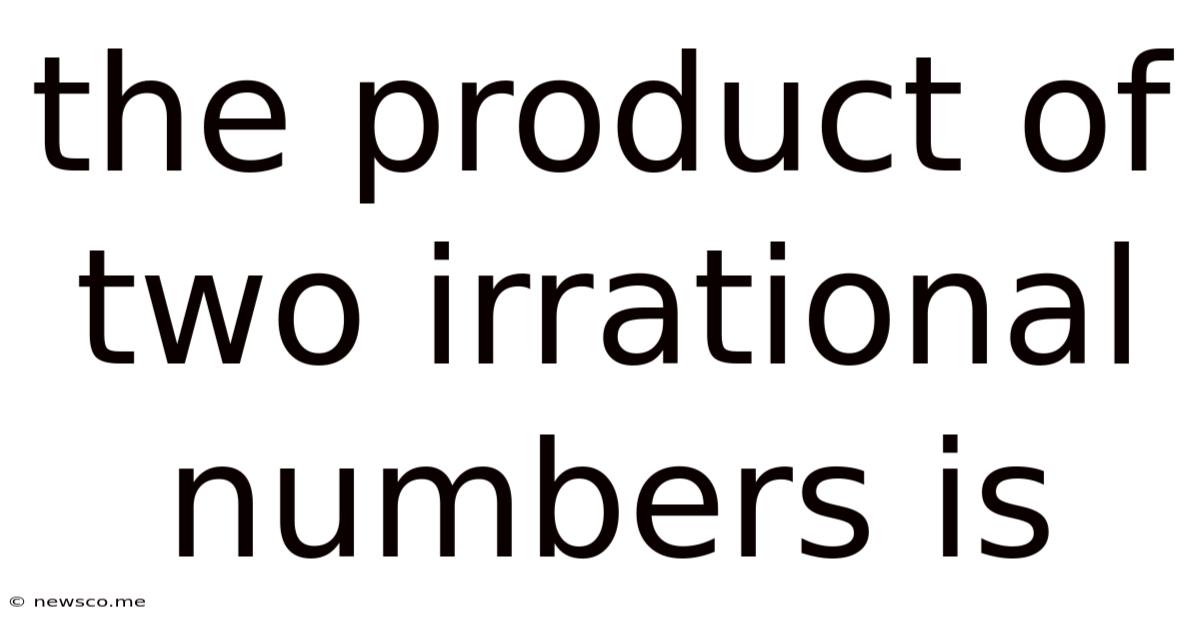The Product Of Two Irrational Numbers Is
News Co
Apr 26, 2025 · 4 min read

Table of Contents
The Product of Two Irrational Numbers: A Deep Dive into the Unexpected
The world of numbers is a fascinating tapestry woven with rational and irrational threads. While rational numbers, expressible as a fraction of two integers, seem straightforward, irrational numbers, like π and √2, defy simple representation. This exploration delves into the intriguing question: what happens when we multiply two irrational numbers? The answer, surprisingly, isn't always irrational. This article will unpack this unexpected complexity, exploring various scenarios and providing illustrative examples to solidify your understanding.
Understanding Rational and Irrational Numbers
Before diving into the product of irrational numbers, let's refresh our understanding of these fundamental number types.
Rational Numbers: These are numbers that can be expressed as a fraction p/q, where p and q are integers, and q is not zero. Examples include 1/2, -3, 0, and 7/9. Rational numbers have terminating or repeating decimal expansions.
Irrational Numbers: These numbers cannot be expressed as a fraction of two integers. Their decimal expansions are neither terminating nor repeating. Famous examples include:
- π (pi): The ratio of a circle's circumference to its diameter, approximately 3.14159...
- e (Euler's number): The base of the natural logarithm, approximately 2.71828...
- √2 (the square root of 2): Approximately 1.41421...
The Unexpected Results: Exploring Different Scenarios
The product of two irrational numbers can surprisingly result in a rational number, an irrational number, or even an indeterminate form. Let's examine each possibility with illustrative examples.
Scenario 1: The Product is Rational
This is perhaps the most counter-intuitive outcome. Consider the following example:
√2 * √8 = √(2 * 8) = √16 = 4
Here, the product of two irrational numbers (√2 and √8) yields a rational number (4). This highlights the unpredictable nature of multiplying irrational numbers. The key here lies in the relationship between the two irrational numbers. Both √2 and √8 share a common factor, allowing their product to simplify to a perfect square.
Let's look at another example:
(√2 + √2i) * (√2 - √2i) = 2 + 2 = 4
Here, we're multiplying two complex numbers, both of which contain irrational components. Yet the product results in a rational number, 4. This emphasizes that the nature of the irrational numbers, in terms of the possibility of cancellation of irrational terms, can greatly influence the outcome.
This is not limited to square roots. Consider the irrational number:
x = 0.101001000100001...
And the irrational number:
y = 1/x
xy = 1, which is a rational number.
Scenario 2: The Product is Irrational
In many cases, the product of two irrational numbers remains irrational. This is often, but not always, the case when the irrational numbers are algebraically independent. While proving irrationality can be challenging, consider:
π * √2
The product of π and √2 is highly likely to be irrational. There's no readily apparent simplification or cancellation. This is a common outcome where no simple relationship exists between the involved irrational numbers. Proving irrationality rigorously can be complex and often requires advanced mathematical techniques.
Similarly:
e * √3
It's highly probable that this product is also irrational. The lack of a clear relationship between the transcendental number e and the algebraic number √3 strongly suggests an irrational result.
However, rigorously proving the irrationality of such products often requires more advanced mathematical tools and analysis beyond the scope of a basic introduction to irrational numbers.
Scenario 3: Indeterminate Forms
Certain products of irrational numbers might lead to indeterminate forms, such as 0/0 or ∞/∞. Consider the scenario where you're dealing with limits involving irrational functions:
lim (x→0) (x√x) / x
This expression simplifies to lim (x→0) √x = 0
While the individual terms might involve irrational numbers within the expression, ultimately the limit evaluates to a rational number. This is an example where the concept of limits can affect the outcome, blurring the boundaries between rational and irrational.
Implications and Further Exploration
The variability in the outcome of multiplying two irrational numbers underscores the richness and complexity of the number system. It illustrates that simple operations, like multiplication, can have surprising and unpredictable results when dealing with irrational numbers.
The investigation into the product of irrational numbers opens doors to deeper explorations:
- Transcendental Numbers: Numbers like π and e are transcendental, meaning they are not the roots of any non-zero polynomial with rational coefficients. The product of two transcendental numbers can be transcendental, rational or algebraic.
- Algebraic Numbers: Numbers like √2 are algebraic, being roots of polynomial equations with rational coefficients. The product of algebraic numbers may be algebraic or irrational.
- Liouville Numbers: These are transcendental numbers constructed in a specific way to easily exhibit their transcendence. Their properties can be studied regarding multiplication and the resulting type of number.
Conclusion: Embracing the Unexpected
The product of two irrational numbers is not always irrational. The result depends heavily on the relationship between the two irrational numbers. This underscores the fascinating complexity of the number system and highlights the need for careful consideration when dealing with irrational numbers in mathematical operations. The seemingly straightforward operation of multiplication can yield surprising and counter-intuitive results, reinforcing the richness and depth of mathematical concepts. Further exploration into the properties of different classes of irrational numbers and their relationships under multiplication can provide valuable insights and unveil additional intriguing patterns within this captivating field.
Latest Posts
Related Post
Thank you for visiting our website which covers about The Product Of Two Irrational Numbers Is . We hope the information provided has been useful to you. Feel free to contact us if you have any questions or need further assistance. See you next time and don't miss to bookmark.